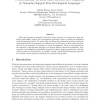Free Online Productivity Tools
i2Speak
i2Symbol
i2OCR
iTex2Img
iWeb2Print
iWeb2Shot
i2Type
iPdf2Split
iPdf2Merge
i2Bopomofo
i2Arabic
i2Style
i2Image
i2PDF
iLatex2Rtf
Sci2ools
140
Voted
FDL
2004
IEEE
2004
IEEE
Predictability in Real-time System Development (1) Semantics Support from Development Languages
With the increasing complexity of real-time control systems, it is important to have sufficient predictability support for a development approach in order to promote the likelihood evelopment success. To achieve this, the abstraction/refinement activities during the development should be performed in an efficient way. In this paper, we first briefly introduce the role of the semantics of languages in system development. Then we investigated how the semantics of development languages can support efficient abstraction/refinement. Subsequently, the insufficient predictability support of existing design approaches for real-time control systems are illustrated by an example. Finally, a predictable development approach for real-time control systems is introduced to overcome this problem.
Development Approach | FDL 2004 | Natural Language Processing | Predictability Support | Real-time Control Systems |
Related Content
| Added | 20 Aug 2010 |
| Updated | 20 Aug 2010 |
| Type | Conference |
| Year | 2004 |
| Where | FDL |
| Authors | Jinfeng Huang, Jeroen Voeten, Andre Ventevogel |
Comments (0)

